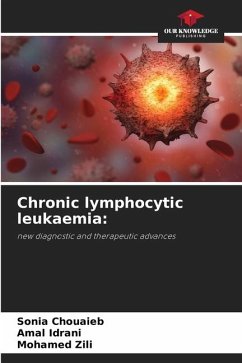Chronic lymphocytic leukaemia is a lymphoproliferative syndrome that generally occurs in elderly patients. It is defined by a progressive accumulation of mature monoclonal B lymphocytes in the blood, marrow and secondary lymphoid organs. Diagnosis is based mainly on B hyperlymphocytosis > 5G/L persisting for more than three months, a blood smear and immunophenotyping of blood cells. Other tests, such as del 17 p +/- Tp 53, IgHV mutation status, CD 38, etc., are of interest in characterising predictive prognostic factors in order to better identify patients at risk of progression and choose the appropriate therapeutic strategy. This haemopathy generally has a good prognosis, but the course is very heterogeneous, with the majority of asymptomatic patients having a survival similar to that of healthy subjects of the same age and sex. On the other hand, some patients have a progressive disease, with an increase in adenopathies and worsening cytopenias, requiring specific treatment.
Bitte wählen Sie Ihr Anliegen aus.
Rechnungen
Retourenschein anfordern
Bestellstatus
Storno









